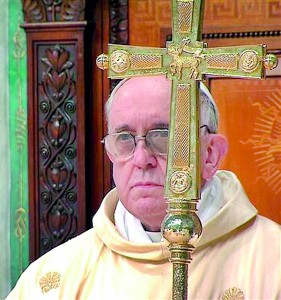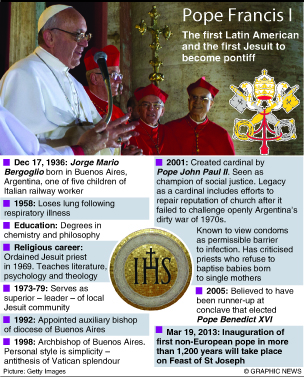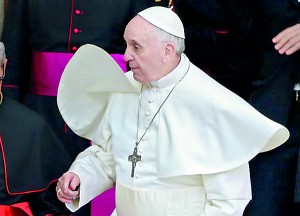Sunday Times 2
Pope Francis I: Perfect conclave candidate
View(s):VATICAN CITY (Reuters) – The cardinals who elect the pope are sworn to secrecy about their deliberations, but details began to filter out on Thursday about how rank outsider Jorge Bergoglio quickly emerged as a frontrunner to replace Pope Benedict.
Bergoglio was a runner-up to the then Cardinal Joseph Ratzinger at the 2005 conclave that made Ratzinger pope. But he was not even mentioned in many media long lists of the likely papal candidates or “papabili” this time around.

Newly elected Pope Francis I, Cardinal Jorge Mario Bergoglio of Argentina, leads a a mass with cardinals at the Sistine Chapel, in a still image taken from video at the Vatican (Reuters)
In the arcane world of papal conclaves, keeping below the parapet until the last minute is, however, considered an advantage. “Enter as a pope and come out as a cardinal” is the saying in Rome, describing how frontrunners leave disappointed.
Bergoglio, a Jesuit known for his humility, lack of pretension and frugality, seems to have had the two qualities that the cardinals had said they were seeking – pastoral skills capable of revitalizing the Church and the potential to bring its dysfunctional government or Curia under control.
He appears to have benefited from anger and resentment among world cardinals about the rivalry and infighting inside the Curia, which sapped the strength of the traditional powerful Italian voting bloc – almost a quarter of the cardinal electors.
This is believed to have undermined the chances of Milan Archbishop Angelo Scola, one of the two frontrunners before the conclave, alongside Brazil’s Cardinal Odilo Scherer.
The Curia problems are widely seen as the fault of a scheming group of Italian prelates close to Vatican Secretary of State Tarcisio Bertone.
Brazilian Cardinal Joao Braz de Aviz had an open argument in one of the pre-conclave congregations with Bertone after the latter accused him of leaking verbatim details of their deliberations to the Italian media.
Braz de Aviz got a round of applause from other cardinals when he jumped up, denied the charge and said he believed someone from the Curia had done it.
The 115 cardinal electors were focused on finding a pontiff capable of facing a crisis caused by a global scandal over priestly child abuse, the “Vatileaks” case that revealed the rivalry and alleged corruption in the Curia, and the rise of secularism, particularly in Europe.
“We were looking for a pope who was spiritual, a shepherd. I think with Cardinal Bergoglio, we have this kind of person,” French Cardinal Jean-Pierre Ricard told journalists on Thursday.
“He is a person of great intellectual character who I believe is also a man of governance.”
FRANCIS QUICKLY EMERGED
Vienna Archbishop Christoph Schoenborn confirmed that Bergoglio had quickly emerged as a very strong candidate, winning election after only five ballots by cardinals ensconced in the Renaissance Sistine Chapel. This is only one more than Benedict, who was a very clear frontrunner in 2005.
“I won’t tell you how our talks went; that is an internal thing. You can say one thing with certainty, Cardinal Bergoglio wouldn’t have become pope in the fifth ballot if he had not been a really strong contender for the papacy from the beginning,” Schoenborn told reporters.
 “You can use your own wisdom to judge that a conclave that lasts little more than 24 hours, one of the shortest in the history of the papacy, shows great unanimity, great togetherness and a strong common view on who we think at this point that God has designated as the follower of Peter,” he said, referring to St. Peter, revered by Catholics as the first pope.
“You can use your own wisdom to judge that a conclave that lasts little more than 24 hours, one of the shortest in the history of the papacy, shows great unanimity, great togetherness and a strong common view on who we think at this point that God has designated as the follower of Peter,” he said, referring to St. Peter, revered by Catholics as the first pope.
Bergoglio kept a low profile going into the conclave. All cardinals from around the world have a “titular church” in Rome, but Bergoglio did not attend Mass at his last Sunday on the eve of the conclave, unlike frontrunners Scola and Scherer, who faced crowds of journalists among their congregations.
During the last conclave in 2005, Bergoglio abandoned his bid to be elected pope, withdrawing when it was clear Ratzinger had an overwhelming vote in the third round.
Insiders said he had never appeared to be seeking the papacy this time.
His Jesuit order was established in the 16th century to serve the papacy, and it is very rare for its members to take senior Church jobs. Bergoglio was the only Jesuit in the conclave, and several members of the order in Rome have expressed astonishment that he was elected pope.
The Argentine cardinal also boosted his chances, like Ratzinger in 2005, with an address to colleagues gathered in pre-conclave “general congregations” that impressed them with its presentation of the problems facing the Church.
The resentment against Italians inside the Curia is also likely to have encouraged the decision to appoint the first non-European pontiff in nearly 1,300 years and bring in an austere prelate from Latin America, home to nearly half the world’s 1.2 billion Roman Catholics, with much greater communication skills than Benedict.
Carlo Marroni, the respected Vatican correspondent for the Italian daily Il Sole 24 Ore, said the votes in the cardinals’ first ballot on Tuesday evening were split between Scola, Canadian Cardinal Marc Ouellet and Bergoglio, with the latter slightly behind.
But overnight, support for Bergoglio grew and continued to climb during the two ballots on Wednesday morning and the first in the afternoon, he said.
By the day’s final ballot, the fifth, Bergoglio had won, pulling in the votes not only of the Latin American cardinals but a large group loyal to Ratzinger that had supported Scola, Marroni said.
There are strong expectations in Rome that Bergoglio will tackle the Byzantine bureaucracy but in a subtle rather than confrontational manner.
A cartoon on the front of the Corriere della Sera daily showed Bergoglio surrounded by alarmed cardinals on the balcony of St. Peter’s Basilica, saying: “My brother cardinals surprised me, but that is nothing compared to the surprise I will spring on them.”
His frugal ways, concern for the poor and common touch are expected to be a sharp contrast with his aloof, intellectual predecessor. He sent a clear signal with his decision to take the name of St. Francis of Assisi, who spurned wealth to pursue a life of poverty.
The Latin American Church is focused more on fighting inequality and poverty and the rise of evangelical churches that woo away its faithful, rather than on the materialism and sexual abuse that dominate concerns in the West.
Like most of the cardinals in the conclave, Francis is as orthodox theologically as Benedict, and no major change in Catholic doctrine is expected.
But his practical style and focus are different and may appeal more to average Catholics than the retired pope’s approach.
| No throne, thank you: Vatican braces for unscripted papacy
VATICAN CITY (Reuters) – The Vatican, an age-old institution used to having almost everything done by the book, is bracing for the unscripted papacy. |
Follow @timesonlinelk
comments powered by Disqus




















